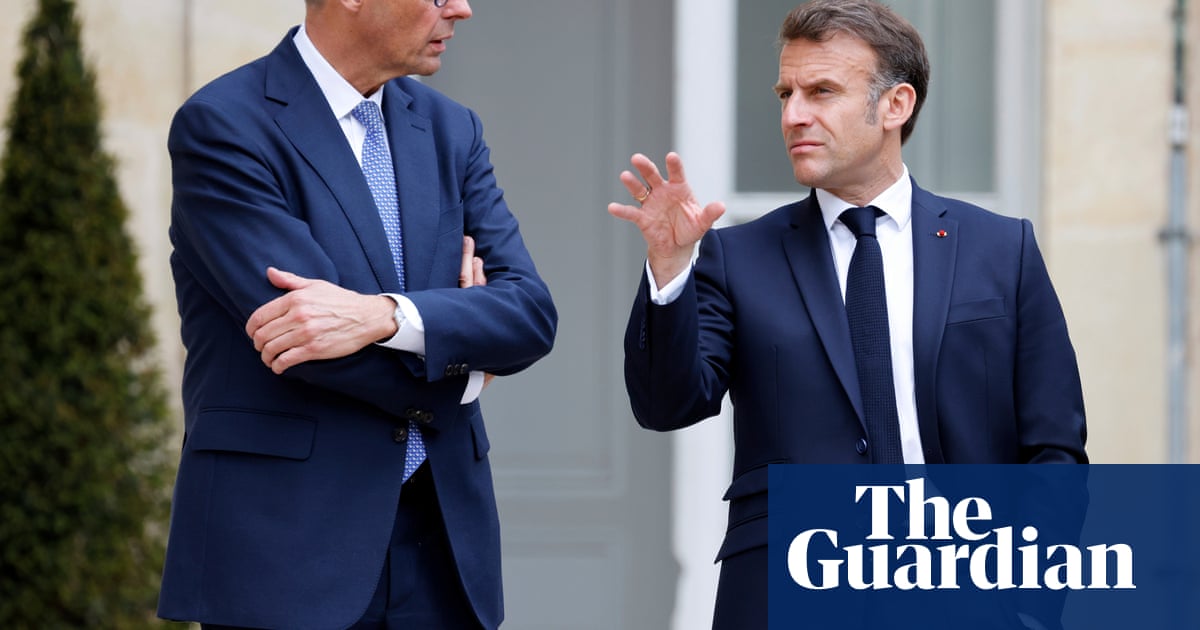France and Germany will seek to jumpstart their relationship,Emmanuel Macronand Friedrich Merz have said on the new German chancellor’s first trip abroad, working “systematically together” in a “new push for Europe”.
Merz told the two leaders’ joint news conference in Paris on Wednesday that a reset in Franco-German relations was vital to helpEuropebecome more secure, competitive and unified so it can overcome “enormous” security and economic challenges.
Merz said: “We will only be able to meet these challenges if France andGermanystand even more closely together than in the past. That is why Emmanuel Macron and I have agreed on a new Franco-German push for Europe.”
The two countries will “set up a joint defence and security council that will meet regularly” as part of efforts to boost defence cooperation and investment, the French president said. They would also aim to coordinate economic reforms, he added.
The Franco-German engine has traditionally helped drive the European project but has all but stalled of late, due most recently to infighting and inaction within the former chancellor Olaf Scholz’s three-way coalitionwhich collapsed in November.
Merz,who was confirmed as chancellor after a shaky start on Tuesday, takes office as Europe scrambles to boost its defences amid Russia’s war on Ukraine and growing doubts over US security commitments to Europe under Donald Trump.
The conservative former MEP has said he wants to fix relations with Germany’s top European allies and pledged to be “a very European chancellor”, as the EU also seeks a trade accord with the US afterTrump’s announcement of sweeping tariffs.
“After years of internal bickering and political navel-gazing under the previous government, what’s needed now is German leadership that doesn’t just observe European policy, but helps shape it,” said Jana Puglierin of the ECFR thinktank.
Puglierin was cautiously optimistic that Merz had made a good start, pointing to his plan to centralise foreign and European policy in the chancellery and the fact that the chancellery and the foreign ministry would be run by the same party.
Sign up toHeadlines Europe
A digest of the morning's main headlines from the Europe edition emailed direct to you every week day
after newsletter promotion
Observers have also said, however, that the two rounds of voting Merz needed to be elected chancellor by parliament underscored potentially damaging disunity in the governing coalition of his centre-right CDU/CSU alliance and the Social Democrats.
Merz, who was travelling to Poland later on Wednesday to meet the prime minister, Donald Tusk, called on all EU members to boost defence spending, saying it was the “only way we can close our capability gaps and collectively support Ukraine”.
He said he wanted to discuss nuclear deterrence in Europe with France and the UK. Asked how Germany could seek to influence talks on a possible peace deal in Ukraine, Merz said there was a proven format of Berlin working with France and the UK, with whom he would “consult intensively”. Merz added that he hoped to consult withPolandas well.
Macron said France and Germany were in close contact in their “unwavering support” for Ukraine. “There is only one question: isRussiaready for a ceasefire lasting at least 30 days in order to be able to build a solid and lasting peace?” he said.
Merz said he was hopeful a permanent ceasefire could be agreed soon, but added that the war could not end “without a continued involvement of the United States of America. This is not something that Europeans can substitute for.”
Analysts expect the relationship between Macron and Merz to be a big improvement on that between the French president and Scholz, noting that Merz has a business background and is a committed European, transatlanticist and Ukraine supporter.
Macron congratulated Merz on Tuesday, saying they could “make the Franco-German motor stronger than ever” in order to “accelerate our European agenda for sovereignty, security and competitiveness. For the French, for the Germans and for all Europeans”.
Merz is more open than Scholz to sending German long-range missiles to Ukraine and to deploying German troops as part of a peacekeeping force. The new German coalition agreement emphasises “strengthening friendships” withFranceand Poland.
The document says the three countries should “align closely on all relevant parts of European policy so that we can act in the most united way possible for the benefit of the whole EU”.
